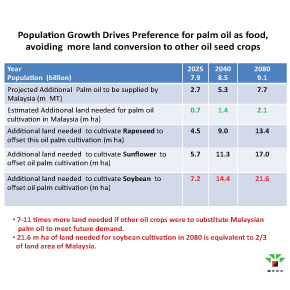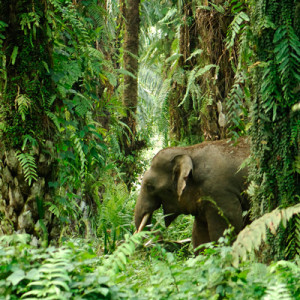Deforestation and Agricultural Development: Why the Double Standards?
It was reported that deforestation and industrialization activities in the developed countries over the last 200 years contributed to the accumulation of atmospheric CO2 whose concentration has increased from 250 parts per million (ppm) to 350 ppm currently. A further increase to 500 ppm in CO2 concentration in the next 100 years is estimated under normal trend and this is projected to raise world temperature by 2 degrees centigrade, causing major climate change phenomena globally.
Three countries namely USA, France and Australia are examples of developed countries which have deforested extensively in the past. The low percentage of forest areas such as 33% in USA , 29% in France and 19% in Australia reflect the high contribution of cumulative build-up of CO2 in the atmosphere from their past deforestation activities.
The UN climate change debate has been focused on getting countries to reduce future CO2 emissions, but the developed countries do not wish to do so without similar commitments from some populous developing countries. Nevertheless, the eagerness of the environmental campaigners to force developing countries to reduce emission has now gone further. They have objected to any form of deforestation in developing countries even when these countries have not yet exercised their right to develop their land assets which are mostly forests.
Malaysia in contrast is an example of a developing country which has been helping to remove CO2 from the atmosphere because of its forest and plantation tree crops which function as a carbon sink. Malaysia was until recently a net carbon dioxide remover therefore helping to slow the accumulation of CO2 emitted from developed countries over the last two centuries when industrialization was taking place, where many countries deforested and became prosperous. The massive occupation of carbon equity in the global atmosphere continues to be dominated by the developed countries. The USA’s gross emission of CO2 annually is close to 7 billion tonnes and net emission is estimated at 6 billion tonnes. In comparison, Malaysia has a net CO2 emission of only 50 million tonnes.
Developing countries are under pressure from developed countries to avoid following their footsteps to achieve prosperity by deforesting land for agricultural development. It is known that agriculture can generate 30 times more revenue compared to land which is kept as forest. Developing countries agricultural commodities are prevented from accessing developed country markets if deforestation is involved in the production process. No consideration is given to the need of developing countries to claim their right to continue developing or to continue to claim their rightful equity in carbon emission space. They are penalized as late comers in the development race, although they have contributed in removing some of the CO2 that is emitted by developed countries all these years.
A typical example of the double standards is how palm oil is demonized in France linking it to loss of forest although Malaysian palm oil is not the cause of deforestation. France has deforested extensively to support its advanced agricultural sector and high income economy. As Malaysia has 56 % forest compared to 29% for France, the country has as much right to develop its land and leave only 29% forest as in France (although Malaysia commits to keep 50% forest). Why then should some French Ministers and environmental NGOs think that it is acceptable for France to have a low percentage (29%) of forest while this trend is not acceptable for Malaysia? Is this to deny Malaysia from having an advanced agricultural sector?
The same argument was posed to the EPA visitors from the US recently who questioned the emission saving capacity of palm oil for use as bio fuel. The US declared on an aggregate level that their soyabean oil is deforestation free because the country has 33 % forest which it intends to maintain for the future. Their soyabean oil is thus accepted for use as biofuel while palm oil is disqualified. Past deforestation emission which accumulated in the atmosphere is not accounted for in the soyabean emission saving evaluation, neither is emission mitigation which can be achieved through reforestation of agricultural land areas. Emission mitigation can be further achieved through importing palm oil which is known for its high yield which will lead to further avoidance of deforestation in countries such as Canada, Brazil or Argentina where additional sources of rapeseed and soyabean oil will have to be imported to overcome shortages in the US food and biofuel industry. This Indirect Land Use Change (ILUC) option has so far been ignored in the EPA’s consideration.
The eagerness to punish developing country’s agricultural commodities was typified in recent NGO sponsored campaigns to label palm oil in Australia. Palm oil was being blamed for being associated with deforestation. It was however rejected by the Australian government after it was pointed out that Australia which is a developed country with a lower population than Malaysia has been deforesting 10 times more than Malaysia in recent years. Why then would Malaysian palm oil be subjected to deforestation labeling when there is more urgency to label Australian agricultural products which are derived from areas that have been extensively deforested? Isn’t this a clear reflection of double standards?
The call for a more level playing field should include provision of time for developing countries to develop their land assets, space for equitable emission of CO2, and a single parameter for a percentage of forest upkeep. It is obvious that the global community should encourage the developed countries to minimize further deforestation and initiate more reforestation. Leakages such as continuing net deforestation in Australia and Canada should be opposed by the ENGOs who are concerned with deforestation.
If the US can declare their soyabean as being deforestation free when they have only 33% forest, Malaysia which has 56 % forest (which is above the US standard of forest upkeep with a big margin to spare) should by the same standard be credited with supplying deforestation free palm oil. If rationality prevails in allowing developing countries to develop their land assets, just like liberalizing international trade, more orderly economic growth and development will be achieved leading to improved efforts in global warming mitigation, with the added benefits of reducing poverty and increasing world food supply.










The double standards are breathtaking in their sheer audacity! In truth all this bs about deforestation is just that…bs! It’s just a convenient ruse for these developed countries to protect their own edible oil industries as they know that there’s no other way their edible oilseed cros can ever dream of competing with the hyper yielding palm oil!